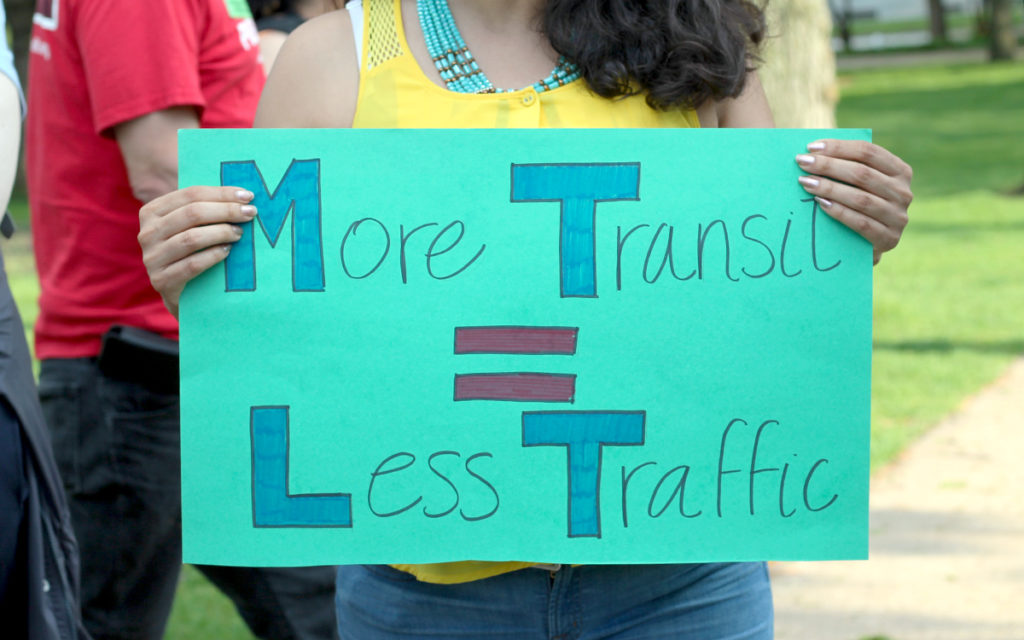Sustainable Transportation is the Climate Solution We Need Right Now
There’s been no shortage of bad news about climate change in recent months. The United Nations report gives us less than twelve years to get it together as a society and limit climate catastrophe. A second report shows climate change is already hurting U.S. communities. It’s not great. But instead of feeling doomed and freaked out, we’re getting to work. Where there’s a problem, there’s a solution. And sustainable transportation is essential to solving the crisis we’re all facing.
Transportation is currently the number one contributor of greenhouse gas emissions here in Minnesota and across the U.S. It’s no surprise: for decades our transportation systems and fossil fuels have gone hand in hand. In 2019, let’s change that with a renewed call for serious investment in essential, climate-friendly options like transit, bicycling, and walking.
According to the American Public Transit Association, communities with strong public transportation can cut carbon emissions by 37 million metric tons every year. Get more people biking and walking and the benefits get even bigger.
Many cities are towns are already proving to be big allies in the shift toward sustainable transportation. As MPR reported this fall, “Both Minneapolis and Saint Paul have aggressive goals calling for 80 to 100 percent reduction in greenhouse gas emissions by the year 2050.” And both are making transportation a key part of their plans. “In Minneapolis, city officials plan to offer a subscription service for unlimited transit use, shared car access and other mobility options such as scooters and ride-hailing. . . . Saint Paul hopes to build 35 ‘mobility hubs’ and hopes to bring 90 percent of its residents within 10 minutes of electric vehicles, transit or bikes and scooters.”
In Duluth, good options are getting even cleaner and greener. The city’s new electric buses hit the streets in November, making Duluth one of the first ten places in the country to take this step toward zero-emissions public transit. The metro region will be following in Duluth’s footsteps later this year. With encouragement from local advocates, Metro Transit recently announced its commitment to electrify its entire bus fleet, starting with the new C Line route in North Minneapolis.
That we make these changes at all is huge, and where we make them is just as important. Carbon pollution is not only bad for our environment, it’s bad for our health. With traffic and congestion comes poor air quality, an increase in asthma attacks, and a variety of other health problems. Communities of color often bear the greatest burden.
The Minnesota Pollution Control Agency recently confirmed what many residents and advocates already know: In Minnesota, “while people of color and lower income tend to own fewer vehicles, do less driving, and use public transit more often than other groups, they are exposed to higher levels of traffic-related pollution.”

Credit: Minnesota Pollution Control Agency
There’s no denying it: the way we get around is a crucial factor in building healthy, sustainable, equitable communities. So how can you make a difference?
Make some changes in your own life. Every time you leave a car off the road, you’re doing something good for the environment. Not everyone is in a position to go car-free. But if you’re able to walk some of the shorter trips in your day or take the bus to work more often, 2019 is the year to start!
Help us grow sustainable options by getting active as an advocate, volunteer, or donor. All of our year-round work advances transportation options that support clean air, a stable climate, and connected communities. This season, Move Minnesota and our allies in the Transportation Forward coalition are fighting to make long-term funding for sustainable transit, bicycling, and walking a top priority at the State Capitol. We’d love your help! Contact finnm@movemn.org to get involved.

